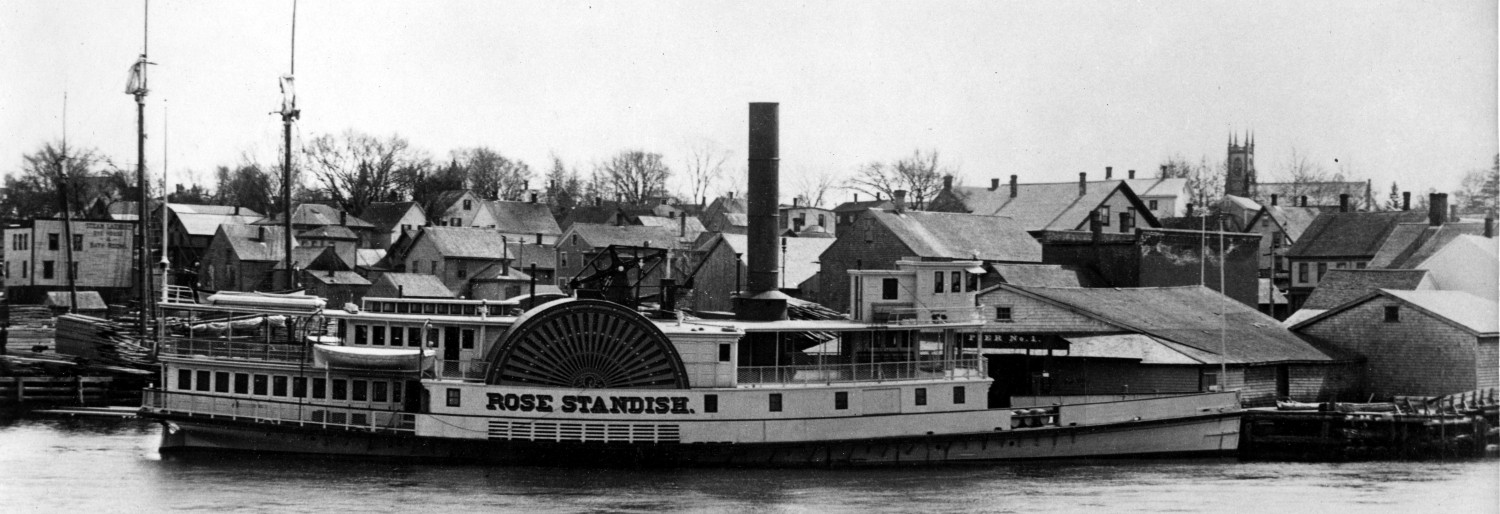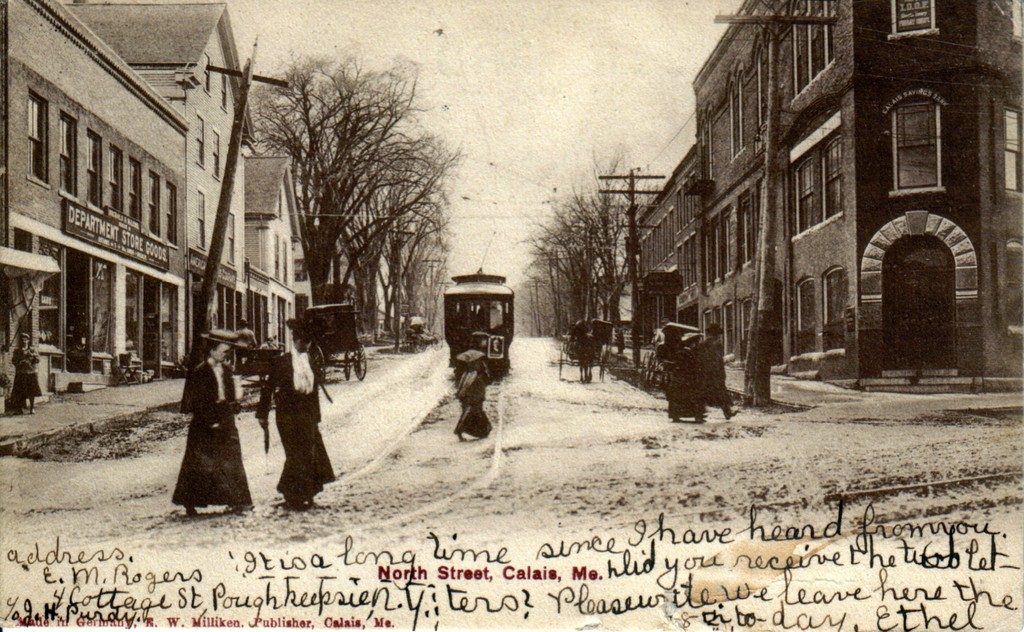
MR. SMITH AT THE SYNDICATE HOTEL
Stephen A. Douglas Smith writes of Calais, its industries and statesmen, both of whom are of international reputation.
At the Hotel Trust.
DEAR UNION:
Still here and doing finely.
I enjoy this town.
You can do less business here and talk more than any other place I ever was in and that hits me all right.
I sold three plows here, all on credit, but I think the customers are all right.
Only two of them had ever been in bankruptcy more than once and they all said they would never go in again unless the Fire Insurance Companies all failed.
The first thing a Calais man does, after he buys a building, is to put a big mortgage on it and then insure the equity.
Then if he wants to sell the property and can’t find a local customer, he knows what to do.
The principal industry of this town consists of a steel bridge, connecting it with the English side.
The bridge didn’t cost over $50,000.00, unless it was built by the Calais City Government, in which case it must have cost more, but no one would ever have known how much, and it has supported a population of about five thousand ever since, with the aid of the tariff laws and the custom house officers.
They are all protectionists here.
When the Wilson bill put wool and lumber on the free list, a good many business men here paid their creditors a percentage.
The rest couldn’t.
There are large families here living on the interest of the duties they didn’t pay. Most of the rest of the population are employed in the Custom House. At present a few are in jail and the remaining nineteen are Democrats.
They have a statue of Henry Clay in the public square with this inscription on it:
“The Father Of PROTECTION The Man Who Made Smuggling Possible.
The Patron Saint of CALAIS.”
His name is not on it and many of the younger men think it is George Curran but there are others who remember farther back and know better.
Mr. Smith was the pen name of the noted satirist, politician and Chief Justice of the Maine Supreme Court William Pattengall from Pembroke who delighted in skewering Maine politicians of both parties. The only thing worse than being on the receiving end of one of his barbed columns was not to be in his line of fire, for then you were presumably a nobody.
Mentioned in the last sentence of Pattengall’s humorous description of Calais and in more detail later is George Curran, the party boss of Calais’ Republican Party, the only party that mattered in the early 1900’s and not by coincidence the Collector of Customs. As such he was an important figure in the 1906 smuggling trial of J.M. Johnson of Calais in Bangor Federal Court for smuggling.
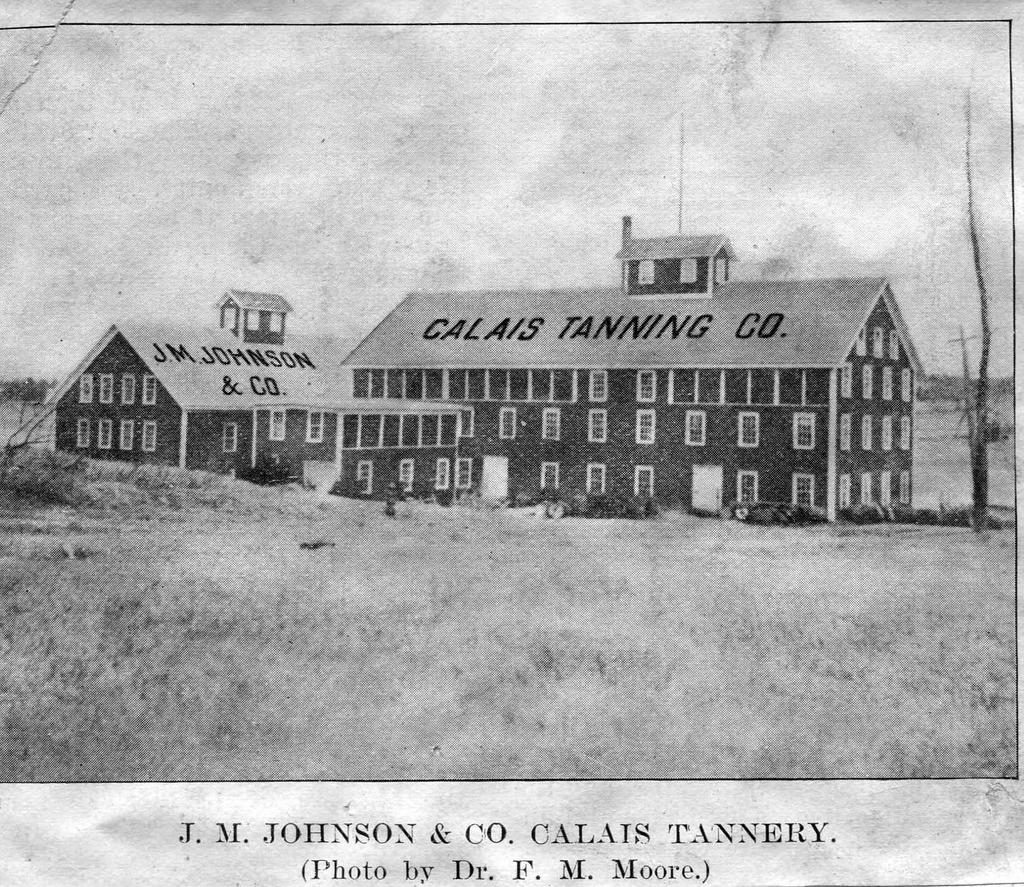
It was alleged that on July 24th and 25th 1905 Johnson had brought a large quantity of hides and wool across the river from St Stephen to his tannery at the bottom of Steamboat Street without reporting the correct quantity to the Collector of Customs George Curran at the Customs House, thereby avoiding the payment of the correct duty.
It was not that George Curran had become aware of Johnson’s criminal activities and taken action in his capacity as Collector to enforce the law. In fact, one of Curran’s inspectors had been on the wharf at the bottom of Steamboat Street on the 24th and 25th of July and had counted the bags of wool and hides on which, Curran said, Johnson had in fact paid the proper duty. Unfortunately for Curran and Johnson two undercover U.S. Treasury agents, Mr. Parr and Mr. Bean, had also surreptitiously witnessed the importation of the hides and wool and they swore that Johnson and presumably Curran’s Inspector had intentional undercounted the quantity of goods imported and demanded Johnson be charged. Atty. Dyer, then U.S. Attorney for Maine conducted an investigation and concluded the government’s case had fatal errors and refused to prosecute. Among the problems Atty. Dyer identified was the tendency of the undercover agents to offer bribes to potential witnesses to testify against Johnson.
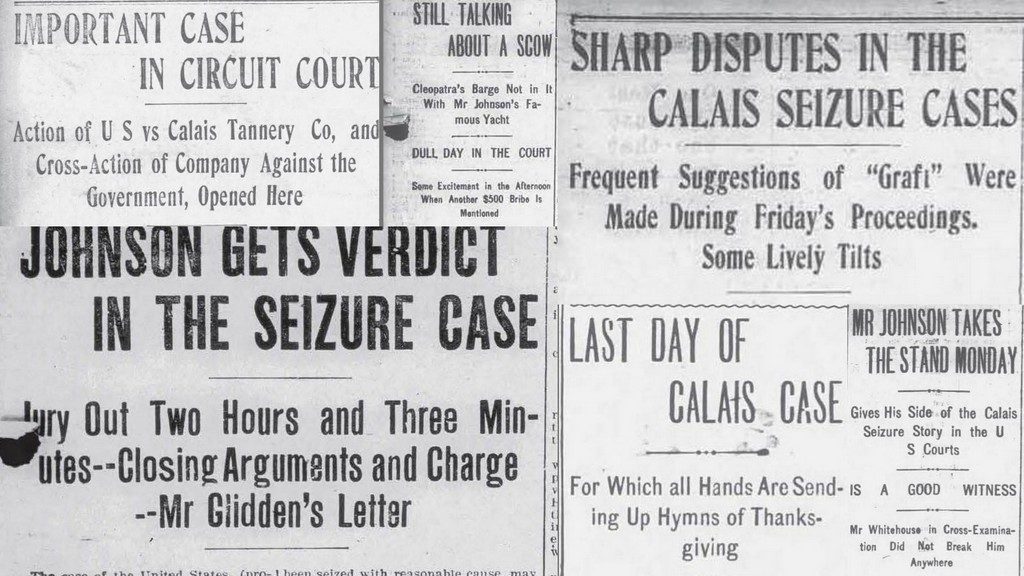
However, by 1906 Dyer had been replaced as U.S Attorney and the case was revived, going to trial in Bangor in June of that year.
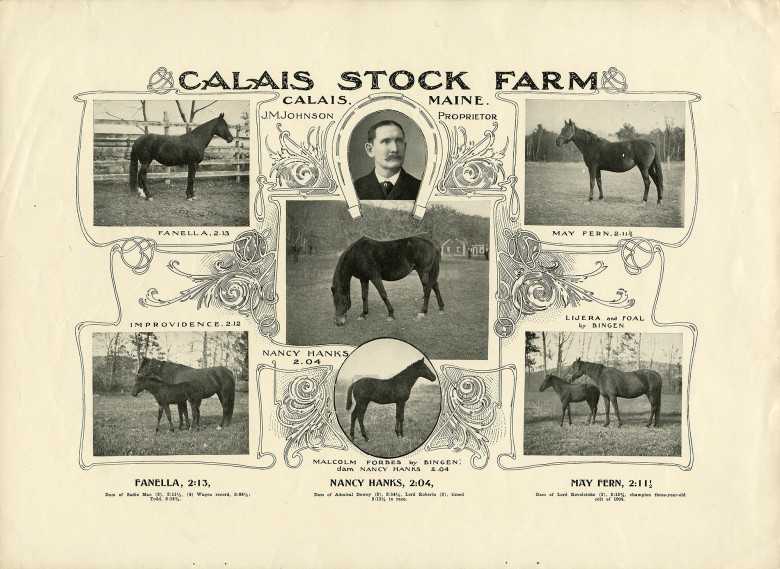
Calais citizens were outraged by the prosecution. Not that anyone from Calais would deny smuggling on a grand scale was a way of life in the St. Croix Valley but because J.M Johnson was a beloved figure in the Valley and, by comparison to others, especially the lumber barons and bootleggers, he was a paragon of virtue and honesty. Almost alone among the large employers in the Valley he treated his employees well and paid a living wage. A gregarious, outgoing sporting man, his first love was horses and horse racing, especially trotters. He had a national reputation as a judge of trotting horses and once owned Nancy Hanks, the undefeated trotting mare named for Abraham Lincoln’s mother. She was the first 2:05 trotter in harness-racing history.
The case took over a week to try and at the time was the longest trial in the court’s history. “Every seat was taken and a formidable array of well-known attorneys showed how extremely important the action is considered” said the Bangor Daily which filed lengthy summaries of the testimony every day. Still, sensational allegations of bribery were often followed by hours of boring, repetitious testimony. In the end the former U.S. District Attorney’s judgment was vindicated. The undercover agent’s credibility was demolished by testimony from several locals, including a railroad agent in St. Stephen who they had attempted to bribe to testify against Johnson. Equally damaging the three local government witnesses, William Gillespie, Seth Avery and Maynard Glidden, who testified to observing the uploading of the goods to support of the government’s contention that much more was unloaded than claimed on the duty form fell apart under cross examination. All had to admit they had been put on the Treasury payroll at $2.50 a day after charges were brought as ‘Special Agents” whose duties, it appeared, were limited to testifying in acceptable fashion at trial.
The trial ended on June 16, 1906 and was duly reported in the Bangor Daily. While lengthy and not sequential it does fairly summarize the case. State witness Maynard Glidden’s seeming admission that he had only told the truth twice in his life leaves a reader feeling sorry for the prosecutor Mr. Whitehouse who did his best given his array of sketchy witnesses. Respected Calais residents including Calais attorney Richard McGarrigle took the stand to testify the government’s witnesses reputation for “truth and veracity” was poor.
The Bangor Daily June 16, 1906:
JOHNSON GETS VERDICT
Jury Out Two Hours and Three Minutes-
Closing Arguments and Charge -Mr. Gliddens’ Letter
The case of the United States, (proceedings in rem) against 83 bales of wool and 5,794 sheepskins, the property of the Calais Tanning Co. of which Hon. J. M. Johnson is president, came to an end at 5.43 p. m. Friday when the jury which had been out two hours and three minutes returned a verdict for the defendant. This means that the wool and the sheepskins, valued at about $12,000, will be returned to the company.
The case is the longest that has ever been tried in the District Court sitting at Bangor. It has aroused intense interest in Calais and Washington County. It has been ably conducted by District Attorney William Treat Whitehouse of Portland, and has been fought tooth and nail by Hen. Orville D. Baker of Augusta, and Guy Murchie, Esq., of Calais.
At times it has fairly bristled with sharp testimony the lie has been passed, politely, but the lie nevertheless. Government witnesses have been accused by the defense of perjury, and the special officers of the government, Messrs. Bean and Parr have been unmercifully flayed. The result means much to Eastern Maine, more to Washington county and everything to the city of Calais. A monster celebration is to be held in Calais tonight, with a mass meeting, fireworks, and band music. It is not expected that the witnesses for the government will be especially popular, and Mr. Bean and Mr. Parr didn’t even have interest enough to come to court and see what the jury had to say.
Mr. Johnson made a brief statement to the News after the trial. I am perfectly satisfied, he said. “I haven’t a bit of fault to find with the secretary of the treasury, or with the prosecution. I have a great deal of fault to “find, however, with the two special representatives of the government, Messrs. Bean and Parr, who rendered false information. “I am glad the thing is ended. It has been a source of constant worry, and I am thankful it is over with.”
Former District Attorney Isaac W. Dyer of Portland was very sweeping in his remarks. He has been caustic right straight through regarding the grounds for prosecution. “This thing will settle back now and is relegated to the cesspool where all such dirty cases go. I guess this is the last time that the government will send special officers to Maine and try to convict on perjured testimony.”
District Attorney Whitehouse is a good loser. He showed a broad minded spirit and didn’t try to trig any wheels with technicalities. Mr. Baker and Mr. Murcie were very happy apparently, Mr. Baker beaming like the setting sun as he disappeared from the court room to go to the hotel.
THANKS THE JURY.
Judge Clarence Hale who presided at the trial, in thanking the members of the jury after they had returned their verdict, stated that the finding had been in accord with the evidence presented and which the Court would have made had it been submitted to him as a matter of fact.
Judge Hale called the foreman up and asked him if there had been much wrangling. None at all, he said. I agree with the verdict, said the judge, and the foreman rubbed the top of his head in embarrassed delight.
ARGUE ABOUT COSTS
Following the finding of the jury Mr. Baker and Mr. Whitehouse made brief arguments regarding the burden of the costs. Judge Hale reserve decision and requested Mr. Whitehouse and Mr. Murchie to prepare briefs. In a case of this sort, said Judge Hale, the burden of the cost must always be borne by the loser, and the loser, in this case is the government. But owing to a most peculiar statute, that states that in the federal courts, the costs of action in which goods have been seized with reasonable cause, costs may be carried by the defense. So I shall have to make a careful investigation.
CRIMINAL INDICTMENTS. Criminal indictments against Johnson, which heretofore have been made public, on motion of Whitehouse, were nol prossed.
300,000 WORDS.
Mr. Clay and Miss Raines, who have made the stenographic reports of the case, and who looked good and tired when court adjourned Friday night, say that they have taken 1500 pages of notes with 200 words on a page. This means that some 300,000 words have been recorded during the progress of the trial.
CORRESPONDENCE.
Mr. Murchie gave out the following letter last night which is self-explanatory. He also appended a portion of the stenographic report of Maynard Glidden, who has been easily the star of the trial in some respects. The letter follows:
Treasury Department, Washington, May 8, 1906. Mr. Maynard A. Glidden, Portland, Maine.
Dear sir: I am advised that you are a material witness in the case of the United States vs. Johnson, charged with smuggling wool. I am further advised through the Department of Justice that since it became known that you are a witness for the Government you have found it impossible to secure employment. It is unfortunate indeed if a government witness cannot find honorable employment in the community where the defendant and the witness reside and it then becomes incumbent upon the Government to protect the honest citizen who is willing to give candidly and honestly the facts which he may know. This therefore certifies that you are employed by the government as Special Employee at $2.50 per day from and after this date until your services are no longer required.
Very Truly Yours,
L. M. Shaw, Secretary.
THE TESTIMONY, Maynard A. Glidden, cross examination, by Mr. Baker.
Q. Mr. Glidden, were you cautioned specially by Mr. Parr to tell the truth and nothing but the truth?
A. I was, yes, sir; I was. I have been cautioned a number of times by him telling me that same thing, and he said he hoped everybody else would too when they got here.
Q. He had a comprehensive interest in the truth, telling all the witnesses, but he specially spoke to you about it, did he?
A. No, I don’t think he specially spoke to me, I have heard him speak to others on the same thing.
Q But he gave you a special caution to be sure and speak the truth, did he?
A. He did tell me to be sure and tell the truth, yes, sir.
Q. And that, I suppose is why you have done it? That is why you have told the truth?
A. Well, I have told the truth since I have been sworn before the United States grand jury.
Q. Before that how was it?
A. I raised my hand and swore.
Q. Before that how was it? Was your practice any different before you were sworn and raised your hand before the United States grand jury?
A. I had lied in some things before that.
Q. So that was before Mr. Parr had cautioned you, I suppose. Was it?
A. No, sir, afterward.
Q. So that Mr. Parr’s admonition hadn’t produced any effect up to that date, his caution hadn’t produced any effect up to that day? You hadn’t swung around
Q. You remember those two particular occasions when you swung around into the path of truth?
Can A. Yes.
Q. What are the dates?
A. Before the grand jury was one, and this court now.
Q. Those two occasions you swung into the path of truth?
A. Yes.
Q. You don’t recall any other occasion when you ever did?
A. No, I can’t say that I ever did.
THE ARGUMENTS.
Never did arguments in any court reflect any more fully the personality of the speakers, than did Mr. Baker’s and the District Attorney’s. Mr. Baker’s was brilliant fast, whimsical, humorous, replete with picturesque phraseology, and withal very emphatic, dramatic and forceful. He flayed and scourged and smothered the witnesses for the state in denouncing “their apparent falsifying”. He eulogized Mr. Johnson and the others whom he said were unjustly placed.
Mr. Whitehouse on the other hand was very serious, logical, and precise. He dealt with figures and statistics. He left the color out, but built, nevertheless, a very impressive structure for the jurors to contemplate which they did, it was shown, with perspiring brows and confused minds. Judge Hale’s charge was brief, scholarly, beautifully worded and impartial, He was given the closest attention. He occupied little over an hour when the jury was dismissed.
Mr. Baker opened the argument for the defense by saying to the jury that in whatever criticism he had to make of the officials and their methods in this case he did not include the learned district attorney who had conducted the case most fairly to all parties but that in civil cases, at least, he had not the decision of whether or not he should prosecute.
Mr. Johnson’s conduct, he said, had from the first been open and above board. He pointed out his invitation extended and declined to go see the wool weighed had they any doubt in being made illegally.
Mr. Baker continued his arraignment of the governments witnesses by referring to Special Employee Glidden as that picturesque and buoyant perjurer, who was, presupposed to be telling the truth in the investigation before U. S. District Attorney Dyer until it was over balanced by the testimony of Mr. Johnson’s witnesses who were placed at the disposal of that official with a request that the case be investigated and the truth unearthed. He also paid his respects to Special Employee Avery who was so large and zealous in the performance of his duty that he swore that he saw Mr. and Mrs. Johnson riding and Mr. Johnson running back and forth between his office and the foundry endeavoring to hide the wool when in fact the register of the Adams House was produced to conclusively prove that Mr. Johnson was in the City of Boston on that day.
In reviewing the case, Mr. Baker gave an original poem on the Counting of the Wool, to prevent, he said, any report of the affair going down into history.
MR. WHITEHOUSE. District Attorney Whitehouse opened his argument for the government immediately after the forenoon recess of the court. He referred in the beginning to the long and tedious days of the trial which had gone on much longer than they had any idea of in the beginning. Every dull day has its bright spot, he said, and they have come in the expressions of mutual admiration of Mr. Baker and the government’s witness Glidden. They have furnished amusement and mirth and no doubt will be tiring pleasant recollections to Mr. Baker even in his declining years.
He continued that he would not feel he had done his full duty in the case if he did not say something in defense of the two special agents of the treasury department who had been the object of the criticism of the defense. District Attorney Whitehouse said these young men with experience of seven years or more in the service of the treasury department were at least entitled to a presumption of honesty, unassailed in character previous to this case.
He called attention to the fact that if they had been the arch-conspirators they were made out to by the defense they would not have made the admission dwelt upon at such length by the defense. In regard to their not going at once to see the wool weighed, they were there to see that the customs regulations were being obeyed and had no idea of saying in effect to Mr. Johnson. They were there to look after smuggling and for him not to do any of it.
In speaking of the events at Calais the district attorney said that while he did not want to cast any reflections on Collector George A. Curran, a genial and easy going gentleman for whom he had the highest regard, it could not be said but that, from the evidence brought out in the case and undisputed, that he had been running a genial and easy going customs house at Calais. Mr. Whitehouse dwelt at some length on the testimony of defendants witnesses John Hatt and Benjamin Pomeroy which varied he said “to meet the issues in the case as they arose”. He also read from the testimony of Melville McCormick as to the number of bales he reported to the treasury agent as being on hand at the time of importation.
“FINALLY ADJOURNED”
